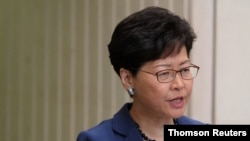Hong Kong’s government has put on hold an extradition bill that has triggered massive protests.
Hong Kong Chief Executive Carrie Lam said Saturday that the government will take no action on the measure until it has consulted with various parties.
The extradition bill would allow criminal suspects to be sent to mainland China for trial. The prospect of extradition to China, which has a substantially different legal system, has alarmed a wide cross section of Hong Kong, from international business groups to legal societies and pro-democracy parties.
Hundreds of thousands of protesters took to the streets Wednesday, when the Hong Kong parliament was scheduled to debate the proposed legislation.
The demonstration, which resulted in violent clashes with police, was strongly reminiscent of the 2014 democracy protests, with a stronger sense of both anger and determination.
The proposed changes to Hong Kong law have attracted criticism from the international community, including the United States. China accused the United States on Tuesday of interfering in its internal affairs. Beijing characterized the largely peace protests in Hong Kong as a “riot” and accused the demonstrators of committing “violent acts.”
Hong Kong, a former British colony, was granted special autonomy for 50 years after it returned to Chinese sovereignty in 1997. But many in Hong Kong are concerned that China is slowly encroaching on those rights and tightening its grip on the territory.
The so-called Umbrella Movement protests were launched in 2014 to demand the direct election of the city’s top leader after China reneged on promises of universal suffrage by 2017. The protests ended without winning any concessions from the Hong Kong government.









